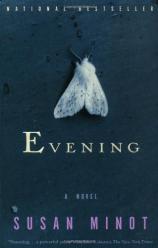Reading Group Guide
Discussion Questions
Evening

1. Minot gives the novel an epigraph from William Faulkner: "I give it to you not that you may remember time, but that you might forget it now and then for a moment and not spend all your breath trying to conquer it." How does this quotation relate to Evening? Does Ann try to "conquer" time?
2. Minot renders Ann's thoughts in what might be called stream-of-consciousness. Which things does Ann remember most distinctly? Which does she remember least distinctly? Which does she repress? What does the relative weight she allows each memory tell us about the emotional shape of her life?
3. Outsiders see Ann rather differently than she sees herself. Her daughter Constance, for instance, says that "her big thing" is "her stuff"; "That's what she cared about, her house and her pictures and all her things" [p. 129]. Her daughters imply that she doesn't laugh much [p. 32]. The doctor's wife says Ann is "just like other women, maybe a little more stylish if you had to say something, but like other women" [p. 12]. What, if anything, does this elderly Ann have in common with the young, passionate Ann she still feels herself to be? What does this dichotomy imply about the differences between our inner selves and the outer person our friends and family see?
4. What might have attracted Ann to each of her three husbands? How did she come to view each of them as the years went by? How does the language in which Ann recalls her marriages differ from the language in which she recalls Harris, and what does this difference in language tell us about her feelings?
5. Ann wishes that she "might have been able to read the spirit within herself and would not have spent her life as if she were only halfway in it" [p. 137], then goes on to reflect that "her life had not been long enough for her to know the whole of herself, it had not been long enough or wide" [ibid]. In what ways has it not been wide enough? Does the fault for this lie with the cruelty of fate, or with Ann herself? If fault lies with Ann, what might she have done to make things different?
6. How would you describe each of Ann's children? How has each been molded and shaped by his or her relationship with her? How does each of them behave toward her? Has the essential sadness of Ann's life rubbed off on them?
7. How has Paul's death affected Ann, Teddy, and the other children? Has it made them closer, or estranged them from one another? How, and at what times, is Ann compelled to remember Paul?
8. What sort of a person is Harris, really? What do you deduce about him and about his feelings, principles, and desires from his behavior, from what others say about him, and from the short section written from his point of view [p. 232-233]?
9. In one of Ann's imaginary discussions with Harris, he says that she might have become a little "hard" [page 224]. Does this seem a fair assessment, judging from what you know of the older Ann? If so, how does this hardness manifest itself and why has she become hard?
10. How does Minot thematically link Buddy's fate with the fate of Ann and Harris's romance? In what ways is this particular weekend the turning point in Ann's life, and how has Buddy's fate intensified this process of change?
11. Does Ann ever feel responsible for what happened to Buddy? Does Harris? Does a sense of responsibility for this tragedy, or a lack of one, have any specific effect on Ann's future life?
12. Ann conducts a number of imagined conversations with Harris in which the two meet again, for the first time in forty years. What sort of person is this elderly, imaginary Harris? Is he the sort of character you can imagine the young Harris growing into? How do you think the real sixty-five-year-old Harris might remember Ann?
13. If Ann and Harris had married, what sort of a life might they have had? Would they have been happy together? Might Ann have been unhappy and unfulfilled even with Harris?
14. The reader of Evening can extract two relatively different messages from the novel: From one point of view, Ann met in Harris the great love of her life, the one true man for her, and his loss was the defining tragedy in her life. Does this interpretation imply that the great, overwhelming passion of romantic love is true and that our happiness depends on following it? From another point of view, when all is said and done, Harris is not much better than or different from any other man. Why was Anne unable to rise above the disappointment of the weekend and open up her heart again? What was it, finally, that prevented Ann from realizing herself?
Evening
- Publication Date: September 7, 1999
- Paperback: 288 pages
- Publisher: Vintage
- ISBN-10: 0375700269
- ISBN-13: 9780375700262








